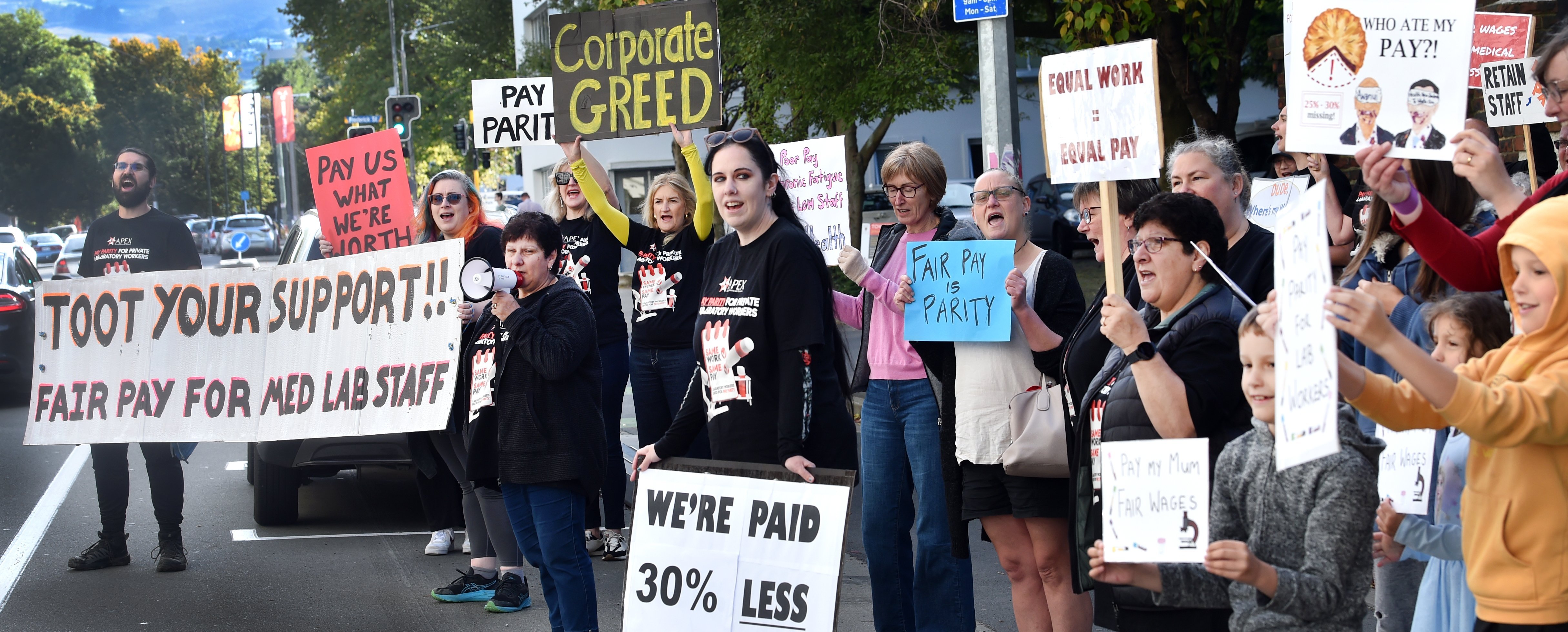
Workers at private company Awanui Laboratories will resume striking tomorrow as they continue to be paid 30% less than people doing the same jobs in the public sector.
The workers have said previously recent pay talks did not reach a satisfactory outcome - the difference in pay parity between Health New Zealand Te Whatu Ora (HNZ) and Awanui remained about 30%.
Apex Union co-organiser Dr Deborah Powell said bargaining with Awanui was ongoing.
There are about 600 Awanui lab workers nationwide, including 123 in Dunedin and 44 in Invercargill.
"One of the problems with this dispute is that people have been leaving the industry altogether, rather than switching to HNZ.
"In the South, we’re running about 50% of capacity - so we’re incredibly short-staffed."
The strike action begins tomorrow and finishes on Thursday.
In Dunedin, pre-op and post-op community-based testing, general community testing and GP pickups will be unavailable for that period.
There will also be partial strikes in Dunedin and the rest of the South Island on April 28.
It comes after rolling strike action from Apex Union members last month.
New Zealand Institute of Medical Laboratory Science president Tony Barnett said pathology services were critical to the maintenance of public health and the health within hospitals.
"The amount of work that is done for the public is enormous.
"The amount of tests that are done on a daily basis, you know, it’s phenomenal."
Dr Barnett said it had been "incredibly difficult" to maintain and recruit new staff and the discrepancy in pay between public and private was only one factor.
"There needs to be some willingness from the employer and there needs to be some willingness from Health New Zealand.
"Both of them recognise the pay discrepancy. But if a private laboratory is trying to address that, then what they need to really be doing is adjusting those contracts with HNZ.
"Now, HNZ sympathise and say that they are 100% behind achieving pay parity across the sector.
"But to do that, they need to recognise that for the private laboratories, the only way they can do that is to increase their contract price."
Dr Powell said the union was not party to the negotiations between HNZ and Awanui.
"They both equally allege different things.
"At the end of the day, this is all public money. It’s all coming out of the health budget - and it’s not transparent when you have private equity companies owning essential medical services."
Awanui followed up a $16 million loss in 2023 with one of $15.8m last year.
NZ Pathology chief executive Dr Peter Gootjes said the main issue arose when HNZ concluded a pay equity settlement with public sector lab workers in 2023.
"This created about a 30% pay gap with their private sector colleagues.
"Understandably, private sector workers want to make up this gap but the amount is simply unaffordable for providers to meet.
"Our members are largely funded by long-run, bulk-funded contracts with Health NZ that do not allow for big increases in wage costs, especially in constrained times."
NZ Pathology represents private lab providers nationwide, including Awanui.
Dr Gootjes said providers continued to work with HNZ "to try to find a win-win solution".
"We have written to Minister of Health Simeon Brown to provide him with details on the issue.
"Our aim is to get this resolved so New Zealanders can continue to receive quality pathology services."
Dr Powell said it was time for a review of the entire contracting arrangement between private medical laboratories and the public sector.
"We’ve certainly made it clear that we believe that this contracting arrangement is no longer fit for purpose.
"What could the future look like? That’s open for debate."












